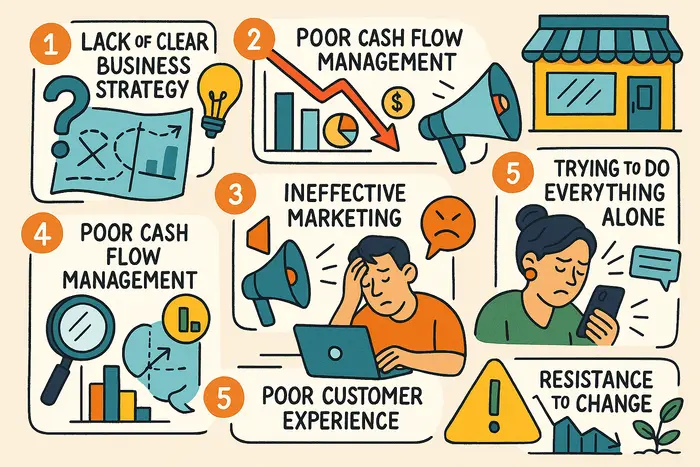Starting a small business takes courage, passion, and hard work. But despite their best efforts, many small businesses don’t make it past the first few years.
Why? Often, it’s not just one big mistake—but a series of smaller missteps that add up over time.
In this article, we’ll explore seven common reasons small businesses fail, and more importantly, how you can avoid them.
1. Lack of Clear Business Strategy
Without a clear plan, it’s easy to get lost. Many small businesses start with a good idea but no roadmap.
How to avoid it:
- Define your value proposition, target market, and key activities
- Set measurable goals and revisit them regularly
- Use tools like SWOT analysis or Lean Canvas
2. Poor Cash Flow Management
A profitable business can still fail if it runs out of cash. Cash flow is the lifeblood of any business.
How to avoid it:
- Monitor your cash flow weekly or monthly
- Build a cash reserve for slow periods
- Invoice promptly and follow up on late payments
3. Weak Understanding of the Market
If you don’t understand your customers, competitors, or industry trends, it’s hard to stay relevant.
How to avoid it:
- Conduct basic market research
- Talk to customers and gather feedback
- Watch what competitors are doing—and not doing
4. Ineffective Marketing
A great product won’t sell if no one knows about it. Many small businesses rely on word of mouth alone.
How to avoid it:
- Develop a simple marketing plan with clear goals
- Use low-cost tools like email, social media, or content marketing
- Track what works and double down on it
5. Trying to Do Everything Alone
Wearing too many hats can lead to burnout and blind spots.
How to avoid it:
- Delegate tasks when possible—even to freelancers or part-timers
- Build a network of mentors or advisors
- Focus on your strengths and outsource your weaknesses
6. Poor Customer Experience
If customers feel ignored or frustrated, they won’t come back.
How to avoid it:
- Make it easy to contact you and get support
- Listen to complaints and act on them quickly
- Deliver consistently great service, even in small ways
7. Resistance to Change
Markets evolve. Technology shifts. Customer needs change. Sticking to the old way can make you obsolete.
How to avoid it:
- Stay curious and open to feedback
- Test new ideas in small ways
- Embrace continuous improvement as part of your culture
Summary: Avoiding Failure Starts with Awareness
Small business success isn’t about luck—it’s about learning, adapting, and managing the basics well.
Key Takeaways:
- Failure often comes from avoidable issues like poor planning or cash flow
- Stay close to your customers, your numbers, and your market
- Get support and stay flexible as you grow
